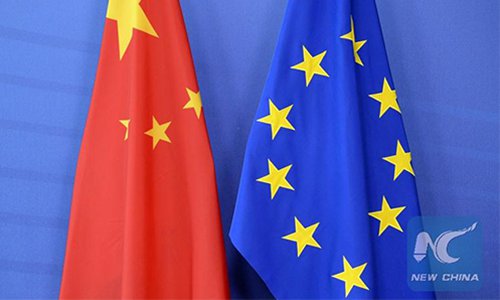China-EU economic partnership to deepen as Germany leads EU
Source:Global Times Published: 2020/6/24 23:33:22

Photo:Xinhua
Relations between China and the European Union (EU) - which are both in support of a multilateral global trade system and in pursuit of economic recovery - will most likely improve to a new level during Germany's rotating presidency of the EU, experts said.
Germany will take over the rotating EU presidency on July 1 and will chair meetings of EU ministers until the end of the year.
Germany will use its upcoming presidency of the EU to "steer the bloc towards a climate-friendly economic recovery from the COVID-19 pandemic," the country's environment minister said Tuesday, according to a Reuters report.
"We always have to keep the big picture in mind. Europe wants to become the first greenhouse gas-neutral continent by 2050. This is the most crucial thing that we can do for future generations," Svenja Schulze, German minister of environment, said.
The strategy matches well with China's "New Infrastructure" drive -- including in 5G networks, Internet of Things, cloud computing, data center and electric cars -- to offset the economic impact of the coronavirus pandemic and boost green growth.
And, the two major economies will have enormous potential to cooperate, experts say
"China's advantages in 5G and emerging business forms such as e-commerce and live-streaming could perfectly combine with the EU's advantages in the traditional manufacturing industry," Zhao Junjie, a research fellow at the Chinese Academy of Social Sciences' Institute of European Studies, told the Global Times, noting that there's great potential yet to be found.
The two could also cooperate in other areas related to post-virus recovery, like machinery, chemicals and medicine, where the industrial chains of the two sides complement each other.
In mid-June, two deals between China and Germany were signed and witnessed by Miao Wei, China's minister for industry and information technology, and German Federal Minister for Economic Affairs and Energy Peter Altmaier, underscoring the broad sphere of bilateral cooperation between them.
Chinese electric automaker JAC signed a cooperation agreement with German automaker Volkswagen, while State Power Investment Corporation signed an agreement with Siemens.
"Stronger financial connections that could also lead to a stronger euro currency are also in the interests of the EU," Zhao added.
Earlier this month, Chinese Premier Li Keqiang held a video meeting with German Chancellor Angela Merkel, during which Li urged both sides to expand two-way opening-up and fully utilize the "fast-track" channel to provide convenience for enterprise cooperation, work resumption and maintaining the stability of industrial chains.
"China-Germany relations are very positive, as Germany is taking a pragmatic approach and has realized there is a great deal of room for future bilateral cooperation," Pang Chaoran, an associate research fellow at the Chinese Academy of International Trade and Economic Cooperation, told the Global Times.
The US has been courting and pressuring its European allies to help contain China. But relations between the US and EU economies have been strained due to the Trump administration's America First policy, creating a sense of urgency in the European bloc of the need to strengthen ties with China, analysts said.
The US is weighing new tariffs on $3.1 billion of exports from France, Germany, Spain and the UK, adding to an arsenal the Trump administration is threatening to use against Europe that could spiral into a wider transatlantic trade fight, according to a recent Bloomberg report.
"However, the EU ought to be aware that China has no intention of 'replacing' any country, but China is always willing to cooperate with EU economies while the US government cannot do," said Zhao.
In 2019, the EU was China's biggest trading partner, and China was the EU's second largest. Trade in goods between the two was worth more than 1.5 billion euro ($1.68 billion) a day.
Global Times
Posted in: DIPLOMACY